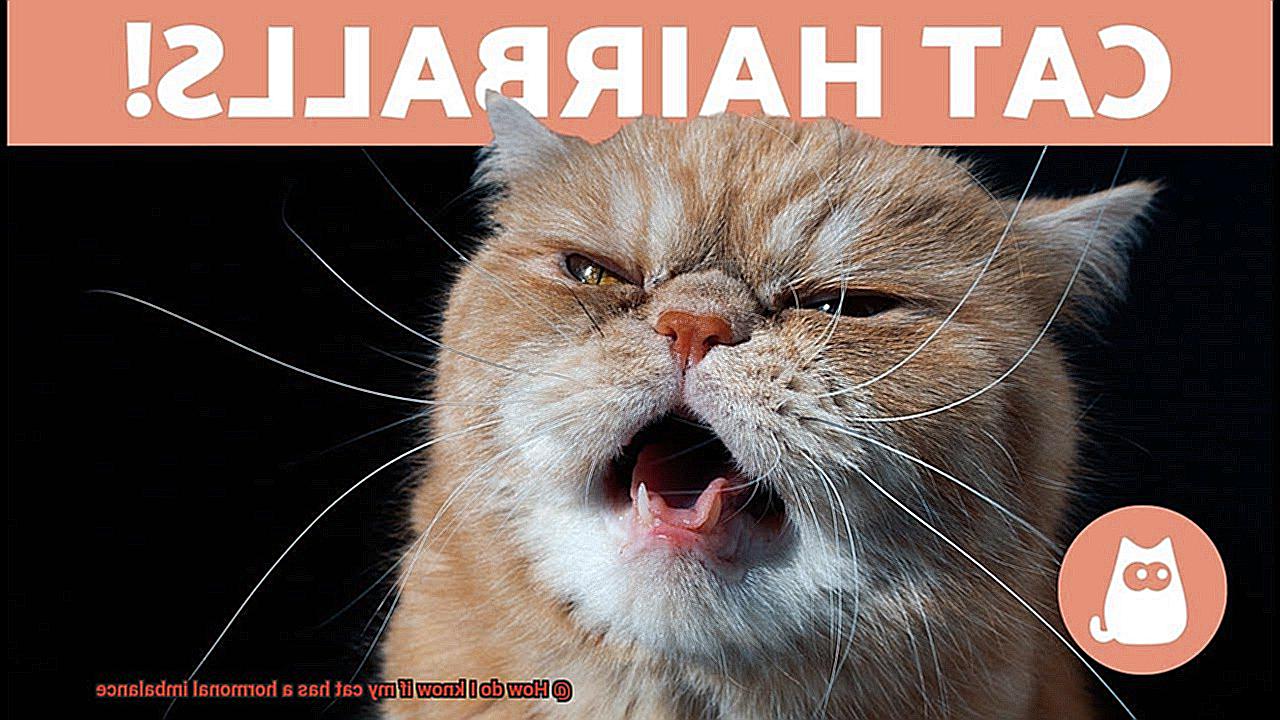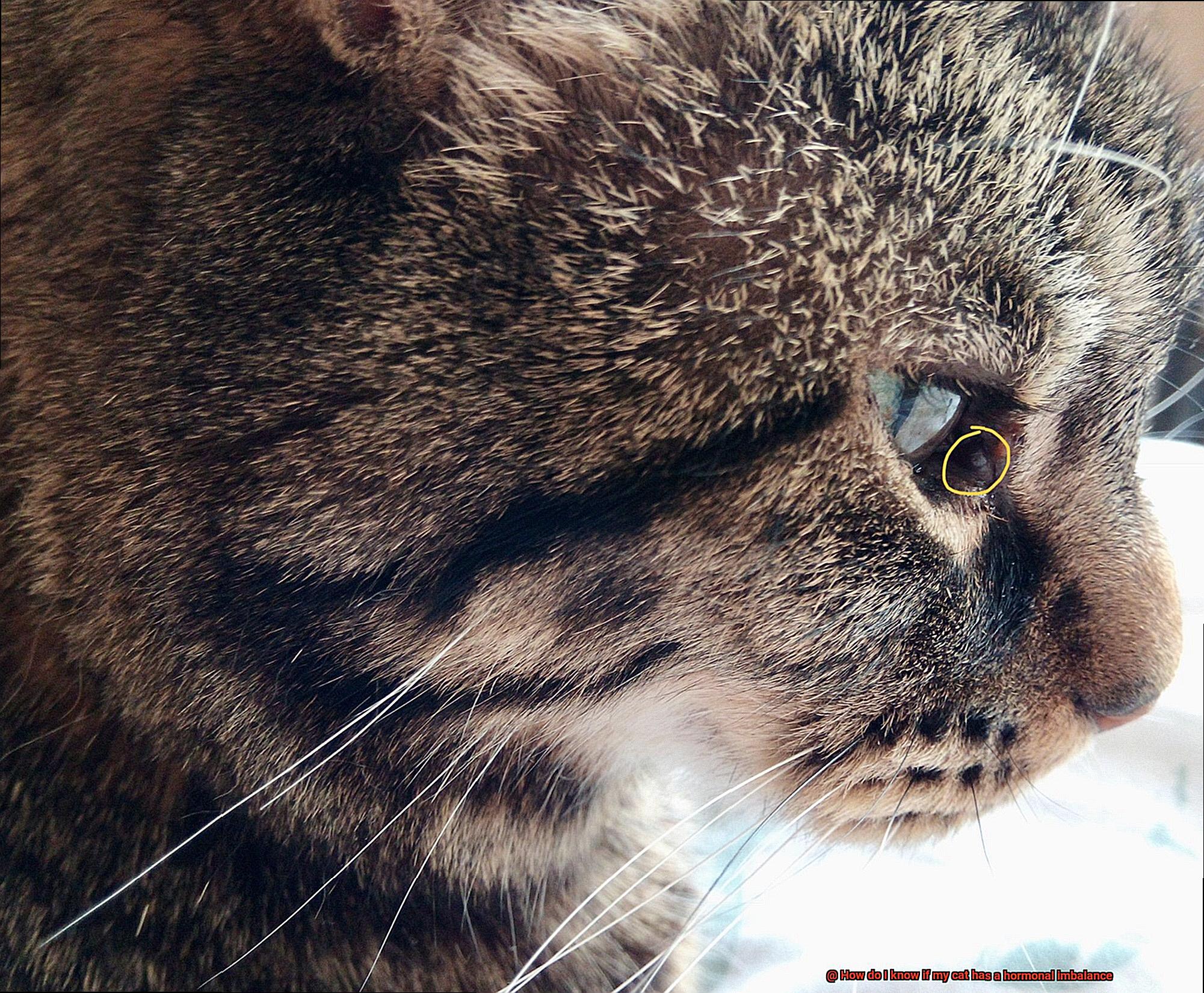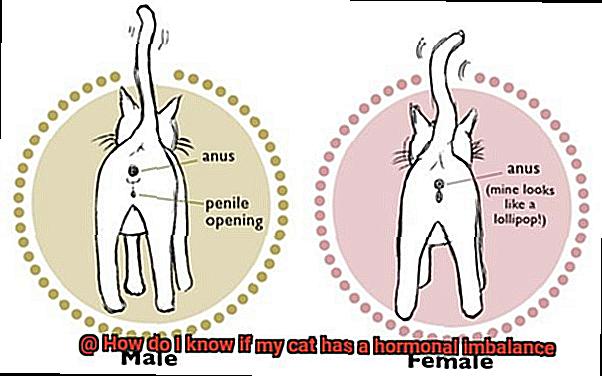Cats are truly captivating creatures, with their enigmatic personalities and graceful movements. However, as a cat owner, you may have noticed some changes in your feline friend’s behavior that could signal an underlying issue. One of the most common problems in cats is hormonal imbalance, which can lead to a host of health issues that can affect your cat’s well-being.
Hormonal imbalances can occur in both male and female cats and can stem from various factors such as genetics, environment, age or underlying medical conditions. The symptoms may start off subtle but can worsen over time if left untreated. These symptoms include difficulty urinating, weight gain or loss, poor coat quality or even diabetes.
So how do you know if your cat is suffering from hormonal imbalance? In this article, we’ll delve into the signs that might indicate your cat is dealing with a hormonal imbalance and what you can do to help them regain their health and happiness. Keep reading to discover more about this intriguing topic and learn how to keep your furry companion feeling their best.
What is Hormonal Imbalance in Cats?
However, sometimes things can go wrong, and your cat may develop a hormonal imbalance. Hormones are crucial for the proper functioning of various body systems, including metabolism, immunity, and reproduction. When there is an abnormality in the production or regulation of hormones in their body, it can lead to several health problems in cats.
Hyperthyroidism is one of the most common hormonal imbalances in cats. This condition occurs when the thyroid gland produces an excess of thyroid hormone, which can cause weight loss, increased appetite, and restlessness. Diabetes mellitus is another hormonal imbalance that affects cats. This condition occurs when there is a deficiency of insulin, a hormone that regulates blood sugar levels, leading to increased thirst, urination, appetite and weight loss.
Hypothyroidism and Cushing’s disease are two other hormonal imbalances that can affect cats. Hypothyroidism happens when the thyroid gland produces too little thyroid hormone, causing symptoms such as lethargy, weight gain, and changes in coat appearance. Meanwhile, Cushing’s disease occurs when there is an excess of cortisol hormone which can also cause similar symptoms.
It is crucial to keep an eye out for any signs of hormonal imbalances in your cat. Changes in behavior such as lethargy or withdrawal, alterations in appetite or weight loss, changes in coat and skin condition such as excessive shedding or bald patches, and changes in their reproductive system are all signs that something may be wrong.
If you suspect your cat may have a hormonal imbalance, it is essential to seek veterinary attention promptly. Your vet will recommend appropriate diagnostic measures such as blood tests or other diagnostic tools to determine if your cat has a hormonal imbalance. They will then recommend appropriate treatment options based on your cat’s specific condition.
Common Signs and Symptoms of Hormonal Imbalance in Cats
However, hormonal imbalances can interfere with your cat’s overall well-being. Hormones play a vital role in regulating various body functions, including metabolism, growth, and behavior. When hormones go awry, it can lead to different health problems that can affect your cat’s health.

The following are common signs and symptoms of hormonal imbalances in cats that you should be aware of:
Changes in appetite: Hormonal imbalances can cause your cat to lose their appetite or become excessively hungry. These changes in appetite can result in rapid weight gain or weight loss.
Changes in behavior: Hormonal imbalances can cause significant changes in your cat’s behavior, such as increased aggression, anxiety, lethargy, or restlessness. Your cat may also become vocal or show signs of discomfort.
Changes in coat condition: Hormonal imbalances can alter your cat’s coat condition, resulting in hair loss, thinning, or excessive shedding.
Changes in urination habits: Hormonal imbalances can cause your cat to urinate more frequently than usual or have accidents outside the litter box. Your cat may also experience pain or difficulty when urinating.
Changes in reproductive behavior: Hormonal imbalances can cause changes in your cat’s reproductive behavior, such as excessive grooming of the genital area or marking territory.
If you notice any of these signs and symptoms in your cat, it is essential to seek veterinary attention promptly. A proper diagnosis and treatment plan can help manage the hormonal imbalance and improve your cat’s quality of life.
Behavioral Changes
So when you notice sudden changes in their behavior, it can be concerning. One possible culprit of these behavioral changes could be a hormonal imbalance.

Hormonal imbalances in cats can upset the delicate balance of hormones in their bodies, resulting in a host of behavioral changes. These changes can range from increased aggression to lethargy and anxiety.
If your usually mild-mannered cat suddenly becomes more aggressive than usual, it may be due to an excess of testosterone in male cats or an imbalance of estrogen in female cats. Furthermore, cats with hyperthyroidism may become more irritable and restless due to heightened activity levels.
On the flip side, if your cat seems unusually lethargic or inactive, it could be a sign of hypothyroidism or low levels of cortisol. These hormonal imbalances can cause fatigue and decreased energy levels, leading to less interest in playing or other activities.

Anxiety is also a common behavioral change associated with hormonal imbalances in cats. Felines with hyperthyroidism or Cushing’s disease may experience heightened anxiety levels due to increased hormone production. This can manifest as excessive grooming, pacing, and other nervous behaviors.
If you notice any unusual behavioral changes in your cat, it’s crucial to take them to the vet for a proper diagnosis. A hormonal imbalance can be easily treated with medication, but early detection is key to ensuring your cat’s health and well-being.
Changes in Appetite and Weight
One area to pay attention to is their appetite and weight. Changes in these areas can often be an indication of a hormonal imbalance in your furry friend, so it’s crucial to stay alert.
Hormones are key players in regulating a cat’s appetite and metabolism, so any sudden changes should be taken seriously. If your cat is eating more or less than usual, it could be a sign of a hormonal imbalance. For instance, if your cat is consuming more food than usual but still losing weight, it could signal a problem with their thyroid gland, which produces hormones regulating metabolism. Alternatively, if they’re eating less but gaining weight, this could suggest insulin resistance or diabetes.
Nevertheless, hormonal imbalances aren’t the only culprits behind changes in appetite and weight. Dental problems or gastrointestinal disorders can also play a role. That’s why it’s vital to take your cat to the vet for a thorough checkup if you notice any changes in their eating habits or weight.
To diagnose a hormonal imbalance, your veterinarian may perform blood tests to check hormone levels in your cat’s body. Based on the results, they may suggest hormone replacement therapy or other treatments to restore balance.
Changes in Coat and Skin Condition
It could be a sign of hormonal imbalances that play a crucial role in maintaining healthy skin and fur in cats. Hormonal imbalances can lead to a variety of skin issues, such as excessive shedding, thinning or bald spots, dryness, and irritation.
Hyperthyroidism is one of the most common hormonal imbalances that affect a cat’s coat and skin condition. It is caused by an overactive thyroid gland and can result in hair loss, brittle hair, and a dull coat. Another hormonal imbalance that affects the skin is Cushing’s disease, caused by an overproduction of cortisol. This disease can cause hair loss on the belly, back legs, and tail.
It is essential to take your cat to the veterinarian if you notice any changes in their coat or skin condition. The vet will perform a physical exam and may run blood tests to check for any hormonal imbalances. Early detection of these conditions is crucial for proper diagnosis and treatment.
Apart from medical treatment, there are things you can do at home to help improve your cat’s coat and skin condition. Regular grooming, such as brushing and bathing, can help remove dead hair and promote healthy fur growth. Feeding your cat a balanced diet rich in essential fatty acids can also aid in improving their coat and skin health.
Reproductive System Changes
That’s why it’s essential to keep an eye out for any changes in their reproductive system. These changes can be a clear indication of a hormonal imbalance, which can lead to other health issues such as hair loss and skin irritations.
Female cats may experience abnormal heat cycles, including showing no signs of going into heat at all. They may also exhibit vaginal discharge or swelling of the mammary glands. As for male cats, they may experience changes in their testicles, including swelling or shrinking. Additionally, they may exhibit aggressive behavior or have a decreased interest in mating.
It’s crucial to remember that not all reproductive system changes in cats are due to hormonal imbalances. Some changes may occur naturally as your cat ages, or due to illness or injury. Therefore, it’s crucial to take your furry friend to the vet for early detection and proper diagnosis.
Monitoring your cat’s overall health and behavior is essential. Suppose you notice any concerning symptoms such as weight gain or loss, hair loss or skin irritations. In that case, it’s time to seek veterinary care immediately.
In some cases, hormonal imbalances in cats can be treated with medication or hormone therapy. However, it’s vital to carefully consider the potential risks and benefits of any treatment plan and work closely with your veterinarian to ensure the best possible outcome for your cat.
Conclusion
As a cat owner, it’s important to be vigilant for any changes in your furry friend’s behavior that could indicate an underlying problem. One of the most common issues in cats is hormonal imbalance, which can lead to a range of health problems that impact your cat’s well-being. Hormonal imbalances can occur in both male and female cats and can stem from various factors such as genetics, environment, age or underlying medical conditions.
The symptoms of hormonal imbalance may start off subtle but can worsen over time if left untreated. These symptoms include difficulty urinating, weight gain or loss, poor coat quality or even diabetes. It’s crucial to keep an eye out for any signs of hormonal imbalances in your cat.
Changes in behavior such as lethargy or withdrawal, alterations in appetite or weight loss, changes in coat and skin condition such as excessive shedding or bald patches, and changes in their reproductive system are all red flags that something may be amiss.
If you suspect your cat may have a hormonal imbalance, don’t hesitate to seek veterinary attention promptly. Your vet will recommend appropriate diagnostic measures such as blood tests or other diagnostic tools to determine if your cat has a hormonal imbalance. They will then recommend appropriate treatment options based on your cat’s specific condition.
In conclusion, monitoring your cat’s overall health and behavior is crucial. If you notice any concerning symptoms, it’s time to seek veterinary care immediately.







